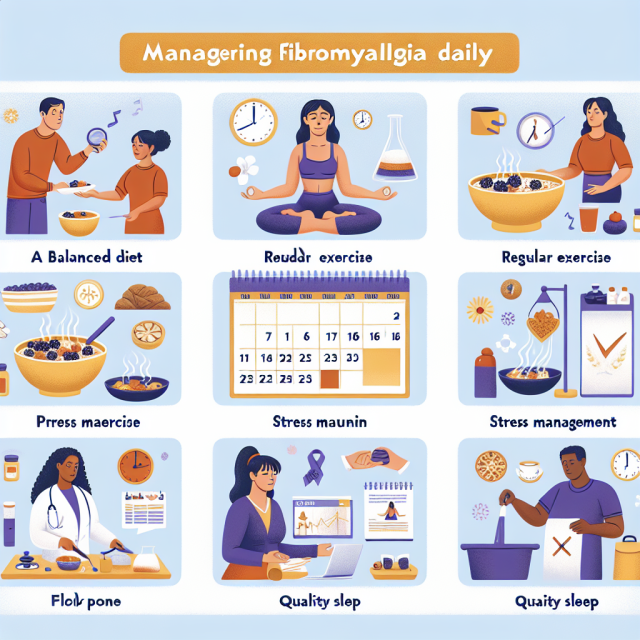
Table of Contents
Introduction
Living with fibromyalgia can feel like you’re battling an invisible enemy. The widespread pain, fatigue, and mental fog aren’t just symptoms; they become constant, unwelcome companions. But with the right self-care strategies, managing fibromyalgia doesn’t have to feel impossible. Let’s explore seven practical tips that can make daily life more manageable.
1. Prioritize Rest and Sleep Hygiene
Good sleep is crucial when dealing with fibromyalgia. But getting quality rest is often easier said than done. Establish a consistent bedtime routine. Aim for the same sleep and wake times every day, even on weekends. Create a relaxing pre-sleep ritual, like taking a warm bath or reading a book, to signal your body it’s time to rest. Using sleep aids, like melatonin, should be discussed with your healthcare provider.
Related link: HealingWell Community Support
2. Gentle Exercise to Stay Active
It may sound contradictory, but regular exercise can reduce fibromyalgia symptoms. Focus on gentle activities, like yoga, swimming, or tai chi, that don’t put too much stress on your body. Movement increases blood flow and releases endorphins, the body’s natural pain relievers. Listen to your body. Even a short walk counts as progress. Imagine your body as a rusted machine needing oil—movement helps loosen and ease the joints.
3. Balanced Nutrition and Hydration
What you eat matters. Anti-inflammatory foods, like leafy greens, whole grains, and omega-3-rich fish, can help manage fibromyalgia symptoms. Avoid processed foods high in sugar and unhealthy fats. Staying hydrated is just as essential. Dehydration can worsen muscle pain and fatigue. Keep a water bottle handy and make a habit of sipping throughout the day.
4. Stress Management Techniques
Stress is like fuel to the fire when it comes to fibromyalgia. Practice stress management techniques daily. Try deep breathing exercises, meditation, or progressive muscle relaxation. Even five minutes of mindfulness can make a significant difference. Apps like Calm or Headspace offer guided sessions tailored to stress relief. Remember, managing stress isn’t selfish—it’s necessary.
External link: Mindfulness for Health
5. Warm Therapy for Pain Relief
Heat can be a powerful tool for easing fibromyalgia pain. Use warm compresses, heating pads, or warm baths to soothe aching muscles. Some people find relief from using electric blankets at night. It’s like wrapping your pain in a comforting hug. Be cautious, though—never apply heat directly to your skin for too long, and avoid scalding water to prevent burns.
6. Set Realistic Goals and Pacing
Living with fibromyalgia requires a careful balancing act. It’s tempting to push through a good day, but overdoing it can lead to a flare-up. Set realistic goals and learn to pace yourself. Break down tasks into smaller, manageable parts. Celebrate small victories, and give yourself grace when you need to rest. Think of energy as a battery; if you drain it too quickly, recharging becomes difficult.
7. Build a Support Network
You don’t have to face fibromyalgia alone. Having a support system, whether it’s friends, family, or online communities, can make a world of difference. Talking to others who understand can provide comfort and practical advice. Websites like HealingWell offer forums for those managing chronic illnesses. Sometimes, just knowing you’re not alone can be incredibly healing.
Conclusion
Managing fibromyalgia is a continuous journey. There’s no magic cure, but with self-care and support, it’s possible to live a fulfilling life. Start small, experiment with what works for you, and don’t give up hope. Each step forward, no matter how small, is a victory worth celebrating.
FAQs
1. What types of exercise are best for fibromyalgia?
Gentle exercises like yoga, tai chi, and swimming are highly recommended. They help reduce pain without putting too much stress on the body.
2. How does diet impact fibromyalgia symptoms?
An anti-inflammatory diet rich in whole foods can help manage symptoms. Avoiding processed foods and sugar is also beneficial.
3. Can warm therapy be used daily for pain relief?
Yes, warm therapy like heating pads or warm baths can be used regularly. Just be careful not to apply heat directly to the skin for extended periods.
4. Are there any effective stress management techniques?
Yes, techniques like deep breathing, meditation, and mindfulness can be effective. Apps like Calm and Headspace are useful for guided sessions.
5. How important is a support network for managing fibromyalgia?
Very important. Having a strong support system, whether in person or online, provides emotional relief and practical tips for daily management.





